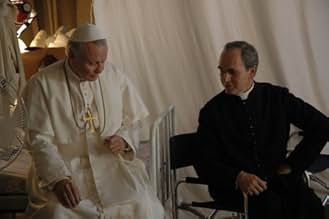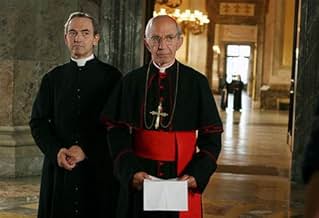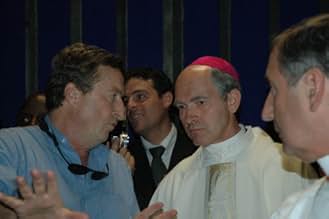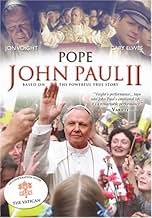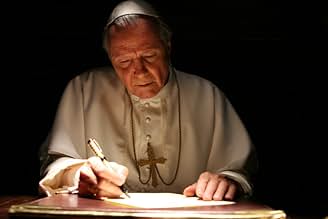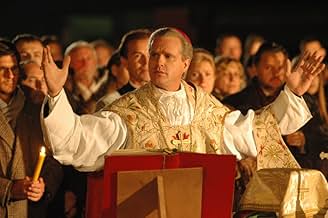VALUTAZIONE IMDb
6,7/10
1301
LA TUA VALUTAZIONE
Cresciuto dal padre a Cracovia dopo la morte della mamma, lo studente Karol Wojtyla lascia i sogni giovanili di recitazione all'inizio della seconda guerra mondiale, sfidando segretamente l'... Leggi tuttoCresciuto dal padre a Cracovia dopo la morte della mamma, lo studente Karol Wojtyla lascia i sogni giovanili di recitazione all'inizio della seconda guerra mondiale, sfidando segretamente l'oppressione nazista nella sua terra natale.Cresciuto dal padre a Cracovia dopo la morte della mamma, lo studente Karol Wojtyla lascia i sogni giovanili di recitazione all'inizio della seconda guerra mondiale, sfidando segretamente l'oppressione nazista nella sua terra natale.
- Candidato a 1 Primetime Emmy
- 3 candidature totali
Sfoglia gli episodi
Recensioni in evidenza
I have always been a Cary Elwes fan and of course, I love John Paul the Great and will always love the greatest saint of modern times but I was never a fan of John Voight until that Sunday night and now I can say that he is one of the best actors of his day he became the late great Holy Father for ninety minutes. yes the mini series made JP II look like saint, but hey is one. Elwes was fine, too old for his his first hour on screen, but passable. my only complaint was that it was too short and rushed in places. the film was reverently, well acted and handsomely crafted. I think it's crime that Voight is not up for a golden globe but I expect him to win an emmy for this one.
I was riveted to the television set, watching Cary Elwes' brilliant and beautiful performance as John Paul the Great. It is such a pleasure to see a show on network TV, which seeks to instruct and uplift rather than the usual trash on TV, which demeans and degrades. When Mr. Elwes spoke, I could have sworn it was Wotyla himself. He captured the accent of the late Pope speaking English to the tee. There is no doubt that the late JPII was one of the most important figures of the 20th century. What I find the most appealing in this show, was the ability of Elwes and Voight to capture the warmth of the man. It also demonstrated his political shrewdness as a voice for Polish freedom. I wish there were more shows like this on television. What a breath of fresh air !!!!...10,000,000,000,000 stars !!!
Folks, last night I watched the second and last part of CBS's biopic on Pope John Paul the Great, and as far as I'm concerned, of the three papal biopics I've seen this year, this one is the best, and the most faithful to the late Pope's life.
So far, this is the only biopic that has respected the order of events in Pope John Paul's life. There was good attention to detail: the conclave scene is faithful down in terms of place and ceremony. You may clearly see the cardinals' seats in the Sistine Chapel, as well as the three-cardinal committee that counted the ballots, everything, including the cry of "extra omnes" ("everyone out") preceding the start of the election, was authentic. The ABC's biopic that aired last Thursday rendition of the same moment seemed oversimplified and rushed in comparison.
The real strength of the movie lies in its cast. Cary Elwes played the younger Karol Wojtyla in the movie's first part and I have to say that at times, and from certain angles, he closely resembled the young Wojtyla. But the thing I liked the most is that he projected an *inner joy* and peace that was captivating. Wojtyla was no sourpuss and Elwes "got it right." The only thing that appeared inauthentic is that when he portrayed the late pope's quarry days during the Nazi occupation, he too seemed chubby and well-fed as compared to pictures Wojtyla in pictures taken at the time. The Nazi diet in Poland was not the best fare and it showed in Wojtyla even on his first photos as a priest. Apparently, Elwes hesitated to go into a drastic diet to change his looks so drastically for this role. I can't say I blame him.
For John Voight, this was an Emmy-worthy performance. It helped that Voight resembled the Pope physically, sharing the same square, strong jaw as John Paul. The way Voight captured Pope John Paul's accent and baritone voice was at times pretty scary, so much so that I wonder how much of his lines were lip-synced to existing audio tracks of the late Pope. Voight's countenance when he opened the Holy Doors for the Year 2000 Jubilee so uncannily resembled John Paul's that I had to blink a couple of times to ensure that I was watching Voight and not John Paul. Therefore, kudos and congrats go too to CBS's makeup department for such an outstanding job. Maybe there's an Emmy here for them too.
Voight captured John Paul's physical suffering so much so that it was inspiring. I bet that is not easy to capture a face paralyzed by Parkinson's disease, but Voight did it, down to the trickle of saliva off the side of his mouth at the reenactment of the Pope's last public appearance.
Secondary characters: James Cromwell played Cardinal Adam Sapieha, Wojtyla's first mentor and Archbishop of Krakow during WWII. You might remember from roles as the robot developer and inventor in _I, Robot_ and as the warp drive inventor, Zefram Cochrane in _Star Trek: First Contact_. He did well in this movie.
Christopher Lee played Cardinal Stefan Wyszynski of Warsaw, Wojtyla's other mentor. You may remember that Lee played Count Doku in the last two episodes of the _Star Wars_ prequel. That was weird I feel bad that I've type-casted poor Christopher Lee into a bad guy role for ever and ever.
I also applaud the portrayal of the Pope's "nephews and nieces," his inner circle of friends and spiritual children, from whom Wojtyla learned so much about the human condition. His friendship with "Roman," a Jewish childhood friend was endearing and illustrative of Pope John Paul's big heartalthough I have to say that I don't remember "Roman" from any of the bios I've read about John Paul. Maybe "Roman" is a composite character. The name of the Pope's childhood Jewish friend was different in the other two biopics. That leads me to believe that's probably the case.
One bad point: the scene where the Pope was in his open pope mobile cruising St. Peter's Plaza, with the columnata in the background, and the crowd in front of him, on his way to be shot by Mehmet Ali Agca looked fake through and through. The three "layers" were superimposed and they sort of "shook" out of sync with normal movement. It may me dizzy to look at it. Thumbs down to the special effects people.
All-in-all, it was a great production. As soon as I'm able, I'll get me the DVD.
So far, this is the only biopic that has respected the order of events in Pope John Paul's life. There was good attention to detail: the conclave scene is faithful down in terms of place and ceremony. You may clearly see the cardinals' seats in the Sistine Chapel, as well as the three-cardinal committee that counted the ballots, everything, including the cry of "extra omnes" ("everyone out") preceding the start of the election, was authentic. The ABC's biopic that aired last Thursday rendition of the same moment seemed oversimplified and rushed in comparison.
The real strength of the movie lies in its cast. Cary Elwes played the younger Karol Wojtyla in the movie's first part and I have to say that at times, and from certain angles, he closely resembled the young Wojtyla. But the thing I liked the most is that he projected an *inner joy* and peace that was captivating. Wojtyla was no sourpuss and Elwes "got it right." The only thing that appeared inauthentic is that when he portrayed the late pope's quarry days during the Nazi occupation, he too seemed chubby and well-fed as compared to pictures Wojtyla in pictures taken at the time. The Nazi diet in Poland was not the best fare and it showed in Wojtyla even on his first photos as a priest. Apparently, Elwes hesitated to go into a drastic diet to change his looks so drastically for this role. I can't say I blame him.
For John Voight, this was an Emmy-worthy performance. It helped that Voight resembled the Pope physically, sharing the same square, strong jaw as John Paul. The way Voight captured Pope John Paul's accent and baritone voice was at times pretty scary, so much so that I wonder how much of his lines were lip-synced to existing audio tracks of the late Pope. Voight's countenance when he opened the Holy Doors for the Year 2000 Jubilee so uncannily resembled John Paul's that I had to blink a couple of times to ensure that I was watching Voight and not John Paul. Therefore, kudos and congrats go too to CBS's makeup department for such an outstanding job. Maybe there's an Emmy here for them too.
Voight captured John Paul's physical suffering so much so that it was inspiring. I bet that is not easy to capture a face paralyzed by Parkinson's disease, but Voight did it, down to the trickle of saliva off the side of his mouth at the reenactment of the Pope's last public appearance.
Secondary characters: James Cromwell played Cardinal Adam Sapieha, Wojtyla's first mentor and Archbishop of Krakow during WWII. You might remember from roles as the robot developer and inventor in _I, Robot_ and as the warp drive inventor, Zefram Cochrane in _Star Trek: First Contact_. He did well in this movie.
Christopher Lee played Cardinal Stefan Wyszynski of Warsaw, Wojtyla's other mentor. You may remember that Lee played Count Doku in the last two episodes of the _Star Wars_ prequel. That was weird I feel bad that I've type-casted poor Christopher Lee into a bad guy role for ever and ever.
I also applaud the portrayal of the Pope's "nephews and nieces," his inner circle of friends and spiritual children, from whom Wojtyla learned so much about the human condition. His friendship with "Roman," a Jewish childhood friend was endearing and illustrative of Pope John Paul's big heartalthough I have to say that I don't remember "Roman" from any of the bios I've read about John Paul. Maybe "Roman" is a composite character. The name of the Pope's childhood Jewish friend was different in the other two biopics. That leads me to believe that's probably the case.
One bad point: the scene where the Pope was in his open pope mobile cruising St. Peter's Plaza, with the columnata in the background, and the crowd in front of him, on his way to be shot by Mehmet Ali Agca looked fake through and through. The three "layers" were superimposed and they sort of "shook" out of sync with normal movement. It may me dizzy to look at it. Thumbs down to the special effects people.
All-in-all, it was a great production. As soon as I'm able, I'll get me the DVD.
I watched both the ABC and CBS versions of the life of Karol Wojtyla. The ABC version was impressive but the CBS miniseries is the one to watch for at Emmy time.
This version opens with the shooting of John Paul II on May 13, 1981. Then we see Karol's earlier life through flashbacks. Sadly, we see only five seconds with his mother, but that scene was wonderful. Add to that about ten seconds of Karol's life as a boy.
From there, we go to Poland in the days of the invasion by the Nazis. Karol is part of a theater group, and he is in college. A number of his friends and even a professor get taken away or killed by the Germans, and he has important choices to make. God's call seems to outweigh all the other factors, and Karol does end up becoming a priest, even though he must break rocks for the Germans. Even while doing that, Karol shows how strong and moral he is. Later, the Communists appear to be less of a threat than the Germans. Maybe so, but they are still manipulating the church for their own purposes.
We see several scenes with Karol's loving father, but for the most part his life is shaped by his superiors in the church, including Cardinal Adam Sapieha. Karol advances more quickly in the church than anyone would expect, making the Communists nervous.
Eventually, a new Pope is needed, and Karol is ready. He seems less reluctant to accept the position in this version, and the election process is shown in more detail (and twice), even using the correct language (which must have been Latin).
As Pope, John Paul II is shown as very loving and caring, interested in the people and in travel, and ready to take on all challenges. World events, especially those affecting Poland, receive a detailed treatment here, and Lech Walesa is a major character.
Cary Elwes did a fine job as Karol in his younger years, showing Karol with quite a sense of humor as well as very intelligent. Jon Voight, who looked less like John Paul II than Thomas Kretschmann, did an amazing job and effectively captured an aging and increasingly frail man who still had faith and a strong desire to serve. All the major actors did an impressive job, but I particularly noticed James Cromwell since I have known him since his days as Stretch Cunningham. Who would have ever believed Stretch Cunningham as a Cardinal? Well, believe it.
The ABC movie may be better for those with a limited attention span. If you want to be entertained rather than educated, this may not be the movie for you, though it includes plenty of entertaining scenes and considerably more laughs than the ABC movie did.
As a work of art, though, the CBS production achieves the excellence broadcast TV often lacks.
This version opens with the shooting of John Paul II on May 13, 1981. Then we see Karol's earlier life through flashbacks. Sadly, we see only five seconds with his mother, but that scene was wonderful. Add to that about ten seconds of Karol's life as a boy.
From there, we go to Poland in the days of the invasion by the Nazis. Karol is part of a theater group, and he is in college. A number of his friends and even a professor get taken away or killed by the Germans, and he has important choices to make. God's call seems to outweigh all the other factors, and Karol does end up becoming a priest, even though he must break rocks for the Germans. Even while doing that, Karol shows how strong and moral he is. Later, the Communists appear to be less of a threat than the Germans. Maybe so, but they are still manipulating the church for their own purposes.
We see several scenes with Karol's loving father, but for the most part his life is shaped by his superiors in the church, including Cardinal Adam Sapieha. Karol advances more quickly in the church than anyone would expect, making the Communists nervous.
Eventually, a new Pope is needed, and Karol is ready. He seems less reluctant to accept the position in this version, and the election process is shown in more detail (and twice), even using the correct language (which must have been Latin).
As Pope, John Paul II is shown as very loving and caring, interested in the people and in travel, and ready to take on all challenges. World events, especially those affecting Poland, receive a detailed treatment here, and Lech Walesa is a major character.
Cary Elwes did a fine job as Karol in his younger years, showing Karol with quite a sense of humor as well as very intelligent. Jon Voight, who looked less like John Paul II than Thomas Kretschmann, did an amazing job and effectively captured an aging and increasingly frail man who still had faith and a strong desire to serve. All the major actors did an impressive job, but I particularly noticed James Cromwell since I have known him since his days as Stretch Cunningham. Who would have ever believed Stretch Cunningham as a Cardinal? Well, believe it.
The ABC movie may be better for those with a limited attention span. If you want to be entertained rather than educated, this may not be the movie for you, though it includes plenty of entertaining scenes and considerably more laughs than the ABC movie did.
As a work of art, though, the CBS production achieves the excellence broadcast TV often lacks.
I dare to think, that my opinion (I am a Pole, coming from Krakow) might be interesting for other watchers of this movie. So here are my remarks.
Polish historical background is shown properly, although movie only marks milestones of Polish history after 2nd World War. Krakow is shown in realistic way, main scenes are shot in REAL historic places f.eg.:
I am under impression of Cary Elwes performance. I always regarded him as a comedy actor. But he shows very good picture of young Wojtyla. On the beginning he is rather 'flat'. But he is getting better getting 'older'. He is in fact very similar to young Wojtyla. Very good job, Cary.
If Cary did good work, Jon Voight have done excellent work. Producers have chosen conclave as the moment of replacing main actor. It is very good idea. Jon Voight perfectly studied mimicry of old Wojtyla, his way of walking (before and after hip operation). He showed us in realistic way growing influence of Parkinson disease. I fully agree he deserves Emmy award. His last public 'dumb' appearance on Vatican window is very touching and memorable picture.
Authors of movie did extremely good research work. Movie quotes several well known memorable pictures of Wojtyla, f. eg:
Sometimes (especially when light dimes and Voight is taken from profile) main actor became so similar to Wojtyla, that you might have impression to watch documentary.
Unfortunately special effects are bad. Pictures of crowd (f.eg. Warsaw mass, St Peter Square) are artificial, flying doves are artificial, German airplanes over Krakow are also too artificial. Maybe it is not visible in TV, but it looks really bad in theater.
And finally last remark. This movie is now distributed in polish cinemas (Poland is probably the only country in the world which broadcasts this movie in theaters). I do not know exactly what is the difference between versions shown in USA in TV and 'polish' theatrical version. I can see it is much shorter (127 min) Unfortunately it is also dubbed. I could not hear polish accent of Jon Voight. If I could vote for main actors only my score would be 10/10. But whole movie (although very good as a TV movie) is not perfect for reasons described above. It deserves strong 8.
Polish historical background is shown properly, although movie only marks milestones of Polish history after 2nd World War. Krakow is shown in realistic way, main scenes are shot in REAL historic places f.eg.:
- Pope 'window' chat on Franciszkanska street
- Krakow's ghetto 'cleaning' on Pilsudski bridge
- meeting with Wyszynski in Corpus Christi church's garden
I am under impression of Cary Elwes performance. I always regarded him as a comedy actor. But he shows very good picture of young Wojtyla. On the beginning he is rather 'flat'. But he is getting better getting 'older'. He is in fact very similar to young Wojtyla. Very good job, Cary.
If Cary did good work, Jon Voight have done excellent work. Producers have chosen conclave as the moment of replacing main actor. It is very good idea. Jon Voight perfectly studied mimicry of old Wojtyla, his way of walking (before and after hip operation). He showed us in realistic way growing influence of Parkinson disease. I fully agree he deserves Emmy award. His last public 'dumb' appearance on Vatican window is very touching and memorable picture.
Authors of movie did extremely good research work. Movie quotes several well known memorable pictures of Wojtyla, f. eg:
- reading a book in canoe - canoe altar mess - making a 'glasses' from hand by Pope - described above last public appearance
Sometimes (especially when light dimes and Voight is taken from profile) main actor became so similar to Wojtyla, that you might have impression to watch documentary.
Unfortunately special effects are bad. Pictures of crowd (f.eg. Warsaw mass, St Peter Square) are artificial, flying doves are artificial, German airplanes over Krakow are also too artificial. Maybe it is not visible in TV, but it looks really bad in theater.
And finally last remark. This movie is now distributed in polish cinemas (Poland is probably the only country in the world which broadcasts this movie in theaters). I do not know exactly what is the difference between versions shown in USA in TV and 'polish' theatrical version. I can see it is much shorter (127 min) Unfortunately it is also dubbed. I could not hear polish accent of Jon Voight. If I could vote for main actors only my score would be 10/10. But whole movie (although very good as a TV movie) is not perfect for reasons described above. It deserves strong 8.
Lo sapevi?
- QuizThis mini-series was approved by the late Pope John Paul II. The project started before his death, and Pope John Paul II was very hands-on with the production and knew of the script. Also, Pope Benedict XVI praised it after watching a screening on November 2005. However, what Pope Benedict XVI saw was a brief cut-down version of Part 1, and all of Part 2, which covers the papacy of Pope John Paul II.
- BlooperAfter Wojtyla accepts the papal election, the cardinals rise and applaud. The camera then pans in towards the new Pope. However, if you look closely, it is actually the mirror image shot from the previous conclave, with John Paul I clearly in the middle of it all instead of John Paul II.
- Versioni alternativeThe theatrical version of the movie shown in Polish cinemas in 2006 is 60 minutes shorter than the original television cut and is not divided into two parts. The dialogs are dubbed by some popular Polish actors and all opening and final credits are printed in Polish. The final credits are accompanied with a song performed by Polish highlanders during John Paul II's visit to Zakopane in 1997.
- ConnessioniFeatured in The 58th Annual Primetime Emmy Awards (2006)
I più visti
Accedi per valutare e creare un elenco di titoli salvati per ottenere consigli personalizzati
- How many seasons does Faith: Pope John Paul II have?Powered by Alexa
Dettagli
- Data di uscita
- Paesi di origine
- Sito ufficiale
- Lingua
- Celebre anche come
- Faith: Pope John Paul II
- Luoghi delle riprese
- Aziende produttrici
- Vedi altri crediti dell’azienda su IMDbPro
- Tempo di esecuzione3 ore 21 minuti
- Mix di suoni
- Proporzioni
- 1.85 : 1
Contribuisci a questa pagina
Suggerisci una modifica o aggiungi i contenuti mancanti

